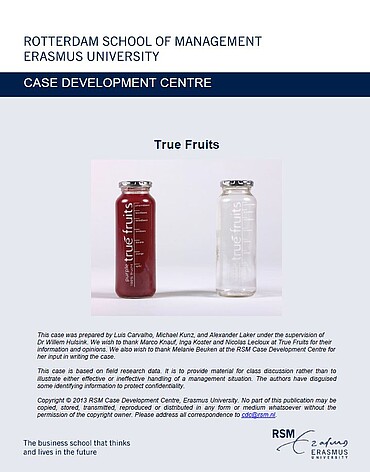Citation Note
Based on Field research; 13 pages.
Follow the 'handle' link to access the Case Study on RePub.
For EUR staff members: the Teaching Note is available on request, you can contact us at rsm.nl/cdc/contact/
For external users: follow the link to purchase the Case Study and the Teaching Note.
Objective
The case has two main focal points. The first involves the way in which a firm positions its brand and how it manages its positioning over time. It provides insights on how positioning is done, how firm the positioning is, and what its limits are. The second focus is on the growth and expansion of a newly formed firm. Students are faced with the early decisions a start-up needs to make in order to pursue growth. This case looks specifically at the following issues: 1. How a firm makes the choice to pursue product expansion as part of its growth strategy in an environment of increased competition. 2. The selection of potential new markets and different foreign market entry modes. 3. How the organizational structure and value chain components affect the potential growth of a firm.
description
True Fruits, a leading smoothie producer in Germany, faced heavy competition by other brand and supermarkets’ hard-nose negotiation over prices. What strategy should the company use moving forward?
Abstract
The case focuses on True Fruits, a leading smoothie producer in Germany. Founders Marco Knauf, Inga Koster and Nicolas Lecloux spent their exchange semester in 2005 in Scotland where they discovered smoothies. When they returned home to Germany, they could not find smoothies in supermarkets and decided to start their own smoothie company. The trio’s aim was to make the most desirable non-alcoholic drink in Germany and to build their business on quality, authenticity, and lifestyle. In 2006, they incorporated True Fruits. They found the right bottler for their smoothies and soon supermarkets began stocking them. From that point forward, the company grew exponentially until they were selling over half a million smoothies per month by 2008. They also expanded to Austria and Switzerland. By 2010, competition from other brands was on the rise, and supermarkets were negotiating sharply over prices. True Fruits had to decide what their strategy for the future would be. Their options included internationalization, expanding production, or expanding the product range. The case addresses hurdles in start-up situations with regard to manufacturing and financing. It also addresses product placement, internationalization, and the diversification of a product portfolio.
usage
This case provides students with an insight to brand positioning (over time), how this is done, and the limitations of positioning. Furthermore, students face the early decisions a start-up needs to make in order to pursue growth.
